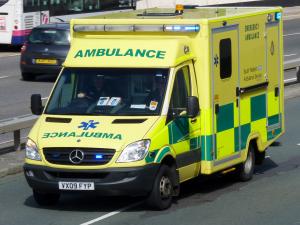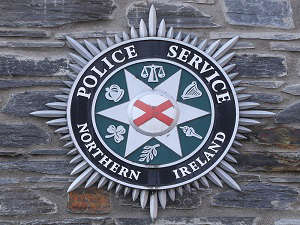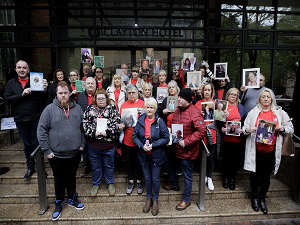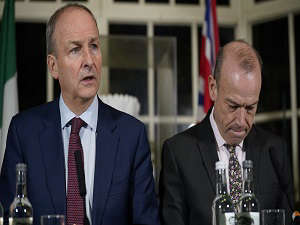
Ambulances are failing to reach dying and seriously-ill patients fast enough as the service creaks under the strain of high demand, according to a report.
Only one of the UK's 13 ambulance services, the Welsh Ambulance Service, is meeting the target to reach patients with life-threatening conditions within eight minutes, a BBC investigation has found.
Freedom of Information requests by the broadcaster found more than 500,000 hours of ambulance crews' time in England, Wales and Northern Ireland was wasted waiting at A&E to hand over patients to hospital staff.
Dr Mark Holland, president of the Society for Acute Medicine, said the "significant strain" on the NHS was due to the Government's failure to accept the social care crisis.
He said: "The Government has continuously failed to acknowledge the scale of the crisis in social care and the record numbers of delayed discharges in our hospitals as a result - a significant factor in the build-up of pressure on our hospitals.
"Having the support and infrastructure in place to discharging medically-fit patients safely is central to releasing pressure on emergency departments, acute medical units and ambulance services.
"It is essential that clinical and political leaders ramp up the pressure and hold the Health Secretary and government to account on this issue before it is too late."
NHS England's ambulance lead, Professor Jonathan Benger, said the rising number of calls the service received was a major factor in the delays.
He told the BBC: "In the face of rising demand it is not surprising we are having difficulty meeting these targets. It is time to look at the system."
An NHS England spokesman said NHS Improvement is working to reduce delays in A&Es receiving patients in England where some hospitals are ensuring extra nursing staff are available at peak times.
"These delays have many contributory causes and often reflect pressure on beds within the hospital as a whole and a system that is struggling to discharge patients to community settings," he said.
"We recognise that handover should occur as soon as it is safe to do so, with ambulances released to return to frontline duties in a timely way.
"All staff are working hard to keep handover delays to a minimum with a view to eliminating them altogether."
A Department of Health spokesman said: "Ambulance services in England are performing well under pressure, responding to the significant majority of the most serious calls within eight minutes."
He added: "NHS England is working closely with ambulance services to improve response times and we're helping recruit 2,200 more paramedics since 2010, as well as increasing the number of training places this year by 60%."
Professor Keith Willett, NHS England's director of acute care, acknowledged the handover issue is a "worsening and serious" problem.
He said officials are looking at how ambulance services respond to 999 calls to improve efficiency. Currently operators have just 60 seconds to make a decision.
"At the end of 60 seconds, if they haven't identified the best resource to send they have to dispatch a blue-light ambulance. That means that 50% of all the ambulances dispatched in England are sent out on an eight-minute response," Prof Willett told the BBC Radio 4 Today programme.
"Less than one in 10 of those patients require that sort of urgency. As a result 25% ambulances that are dispatched like that are stopped before they get there and 40% don't convey a patient to hospital.
"The first part is to sharpen the questions at the front of the questioning so those patients who have a critical, life-threatening event will get an immediate response. Otherwise we are allowing the ambulance services up to another 180 seconds to come to a better assessment."
In trials over the last 18 months, he said there had been no "safety incidents" in more than five million 999 calls and that ambulance services were able to respond better.
Shadow health secretary Jonathan Ashworth said: "This is yet again more evidence of the huge pressures facing the NHS.
"Labour has been warning for weeks now of patients being forced to wait in long ambulance queues outside overcrowded A&E departments across the country.
"Under the Tories our NHS is underfunded and understaffed. The astonishing failure of the Chancellor to provide extra funding for the NHS and social care is proven to be more and more misguided every day."


 Teenage girl killed in road crash named as Kamile Vaicikonyte
Teenage girl killed in road crash named as Kamile Vaicikonyte
 Covid-19 inquiry ‘an opportunity for candour’ from Stormont leaders
Covid-19 inquiry ‘an opportunity for candour’ from Stormont leaders
 UK and Irish ministers to meet amid row over migration
UK and Irish ministers to meet amid row over migration
 Three men set to go on trial for murder of journalist Lyra McKee
Three men set to go on trial for murder of journalist Lyra McKee
 Swann refuses to rule out resigning if budget is not changed
Swann refuses to rule out resigning if budget is not changed